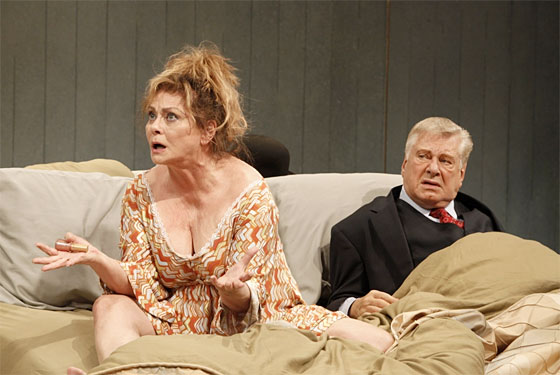
The massive living room of Edward Albee—where couples and families have squabbled over bourbon, word usage, and the Nature of Being for a half-century—is an open plan: It goes on and on, one space bleeding into another, one person oozing into the next. In his latest, Me, Myself & I, Mother (Elizabeth Ashley) can’t tell her twin boys, OTTO (Zachary Booth) and otto (Preston Sadleir) apart: One loves her, one doesn’t, that’s all she knows. Though vastly different in all but appearance, the boys are, for Mother, distinguished only by capitalization: There’s vengeful, predatory all-caps OTTO and sweetly needy lower-case otto—and the former is hell-bent on erasing the latter, first with neglect and denial, then with open usurpation. Let the mirror-smashing begin!
It does, and it’s diverting enough for a while. The playwright’s famous tongue is as tart as ever, his verbal legerdemain intact. (“What have I taught you?” “I don’t know…independence of mind?” “But not from! Not from mind!”) Yet the play is, in essence, play; when threatened with seriousness, it deflects us with epigrams and absurdist monkeyshines. Emily Mann’s indifferent and monochromatic direction does nothing to push back against these evasions and rarely digs into the script’s darker crannies. Strangely for a show that’s composed primarily of direct address to the audience, the overall effect is of a work that’s stubbornly inward-turned and lackadaisical—indulgent and luxurious where it ought to be cosmically, ontologically urgent. It feels like a desultory self-pastiche, a rainy-day perusal of Albee’s old sketchbooks. Here, once again, is the ghost-child, whose very existence is suddenly declared null. Here’s the imperial matriarch with the perforated mind but all claws intact; naturally, she’s matched with a wry beta male (Brian Murray, droll but muted) known as “Dr.,” a layabout live-in therapist whose hyperawareness is no defense against oblivion. And here are the ominous end-of-empire rumblings, with a threat of abandoning the collapsing sandcastle of American civilization and going east to “be Chinese.”
There’s raw energy present, but Mann hasn’t given it much to pop against: As per the stage directions, the play floats in a Happy Days–ish void (a “wasteland,” Dr. calls it, superfluously), and no one character achieves good footing for long. The centerlessness is perfectly intentional, but this stage feels genuinely empty, like an Ikea with the lights on full blast: no shadows, and no substance, and, for long dry stretches, no dimension at all beyond the text. Hovering over all of this is lordly OTTO, who might be a talky, truculent version of the phantom concept-sons from Three Tall Women or Who’s Afraid of Virginia Woolf? He ought to come off as terrifying: He is, after all, a sort of demonic culmination of Albee himself—both the injured child he was and the great playwright he’s become—visiting pain and confusion on characters who’ve already got plenty of both. His sensitive twin is such a sniveler, he’s barely even there, and OTTO’s desire to complete the deletion is understandable. But he’s just not that impressive, as a man or a construct. Played by Booth, he’s just a smug young snot who wouldn’t be out of place razzing noobs at the Princeton Record Exchange. He calls out theatrical conventions and conspires with the audience in snarky tones more Gawker than Woolf, but for an agent of chaos, he’s pretty tedious. Ironic: Now that he’s finally, actually, uncompromisingly real, the Albee ghost-child is a bore. He doesn’t really evolve.
No one does, not even Ashley, with her cat-clock eyes ticking back and forth, watchful and sightless simultaneously. She’s got some fight in her, but nowhere to go: Mother’s obsessions and illusions remain intact and consistent throughout, as does Ashley’s throaty intonation and approach. She’s amusing but impermeable. The play isn’t her story, but whose is it? OTTO/otto’s? For a time, Albee seems to be building to one of his trademark exorcisms, and placing himself in the Linda Blair position: Will the “not nice” solipsist finally engulf the sentimentalist? Will the young, expansive, angry Albee yield to the eraser of this later version, flip and bluff and dismissive? But then he veers off, and instead pops a wheelie of a coup. It’s a magnificent moment, but it also signals Albee’s abandonment of the play. Mann doesn’t fight him, and the show just sighs and sidles offstage. “Things just…vanish around this place,” observes Dr., with his mastery of the obvious. “Well,” says Mother, in another scene, “I helped me. I clarified a lot for me.” Albee no doubt feels the same way; that’s what annotations are for. And that’s what Me, Myself & I is: a set of annotations, interesting, often witty, but mostly marginal, a discursive thought experiment on otto-pilot.
Me, Myself & I
Playwrights Horizons
Through October 10